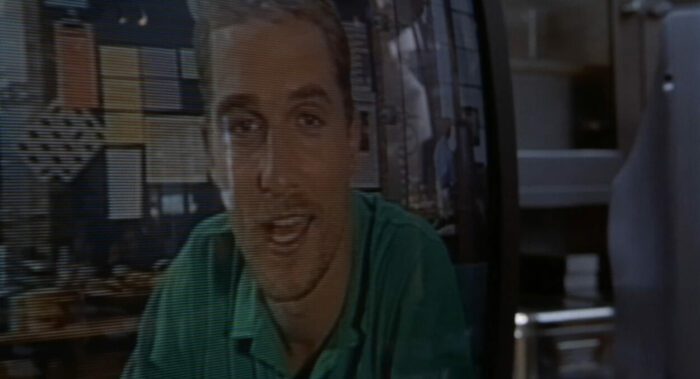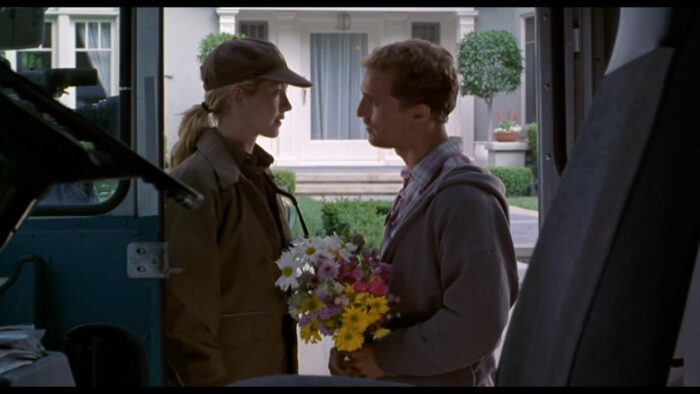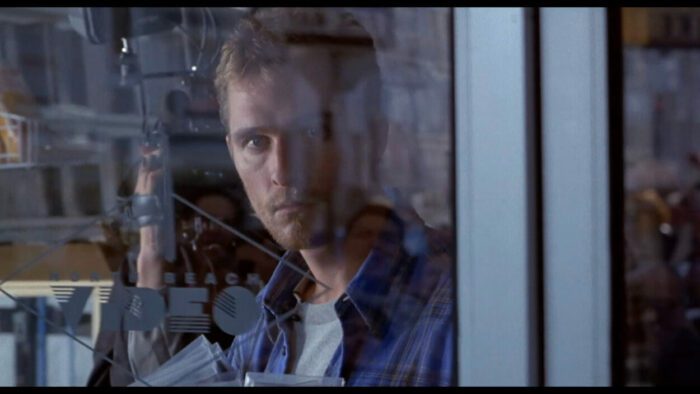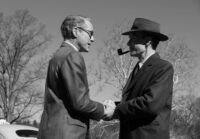JESSE: I imagined a show I want to produce that would last an entire year, twenty-four hours a day. I want to get 365 different video producers around the world to each make their own twenty-four-hour-long document of real-time, capturing life around them just as it is lived. So it’d be people waking up, taking a long shower, getting a cup of coffee, and reading the paper for twenty minutes, a long drive to work.
CELINE: You mean all those boring, mundane things everyone has to do every day of their life?
JESSE: I was going to say the poetry of day-to-day life.— Before Sunrise (1995)
At the time of its release, Ron Howard’s 1999 film EDtv was unfortunately, though perhaps understandably, compared to Peter Weir’s The Truman Show from the summer of 1998. Though the two films share similar subjective matter, the latter is very much speculative fiction, while the former, even with the abundance of star power and familiar faces, resides in the real world. I’ve gone on record regarding how I consider The Truman Show to be a masterpiece. However, after revisiting EDtv, I have to say, I love it more now than I did then. Although, it’s far from being a great movie.
I was in high school when the film premiered. I didn’t have a whole lot of life experience then, not to mention that I had fallen for the comparison mentioned above. It’s not fair to compare two films, regardless of their similarities. It happens, though, and I was no exception. Hopefully, my perspective has changed. EDtv doesn’t completely work because melodrama gets in the way, which at the same time, though contradictory, might be why the film works so well still.
Released in March 1999, EDtv, a comedy filled with dozens of familiar faces, would find itself amidst one of the greatest years for cinema. Like comparing it to The Truman Show, I believe it’s also unfair to compare EDtv to any other film released that year or since. Now, just because I believe two films shouldn’t be compared, am I against comparing a film with, say, a television show? No, I am not. This is because the modes are different enough that it’s less about pitting two films against one another and more about an actual critical comparison to see what kind of conclusions can be drawn.
So, using my logic, I’m going to compare EDtv to two things:
1) reality television
2) social media.
In 1999, EDtv was not a wholly original idea. Yes, it was based on a French film called Louis 19, King of the Airwaves, but concerning American audiences, they weren’t unfamiliar with watching stranger’s lives on television. For example, several years earlier, MTV’s The Real World became popular enough to firmly establish reality television as an entertaining and commercial medium. Still, there was the twist that audiences in the film would not simply watch an episode a week following a man but would have access to him 24 hours a day.
Reality television is more popular now than it was in 1999, and the internet was still relatively in its infancy. Could the filmmakers behind EDtv, as well as those behind Louis 19, have known where we were headed? Whether or not they did is beside the point. The film says it all: society, in general, cannot stop watching, and judging, other people. I believe this has only worsened in the past 25 years.

In the film, Matthew McConaughey plays Ed Pekurny, a 31-year-old, late-‘90s slacker who works in a video store and still lives at home. When his brother Ray, played by McConaughey’s future True Detective co-star Woody Harrelson, auditions to star in a reality show that would broadcast his life 24/7, Ed finds himself accidentally auditioning. As it turns out, the network, True TV, sees more of a hit in Ed as the lead and they convince him to sign a contract.
Up front, it’s clear the villains of the film are those at True TV. Whether it’s the executive played by Rob Reiner or the producer played by Ellen DeGeneres, who, regardless of how I feel about her now, still manages a pretty fantastic performance, True TV uses Ed and the people in his life in pretty awful ways. Yes, people lie, cheat, get jealous, get tempted, are egotistical, are narcissistic, and so on. However, as the film seems to tell us, people are not perfect. Using said people with no regard for their feelings, safety, or mental well-being, all for ratings (which basically means money), is what’s bad. Fair enough.
In the film, Ed’s story takes a fairly unoriginal path. He’s a regular guy who decides to do something with his life, becomes famous, things get complicated, he loses the love of his life, and then has to right everything, ultimately returning to where he started as a better version of himself. The villains and Ed’s journey aren’t what’s important in EDtv, though. The characters and the general plot mentioned above are used to explore society’s relationship with media, specifically the kind that gives society access to the lives of others.
I’m curious as to what the modern-day version of EDtv would look like. To be fair, there are still plenty of popular, and not-so-popular, reality programs on TV as I write this in 2024. Still, if one were to seek access to someone’s life 24/7, the internet seems the place to find it. Social media presents this idea of constant access, but I don’t see any Eds out there live streaming 24/7. At least, not in the level of popularity compared to Ed.
Still, what is it that’s so appealing to watch “real people,” as opposed to actors? In EDtv, the viewers of the show in the film start watching out of some level of curiosity. There are college-aged girls, couples, and even a baby. They see a regular guy with a regular life who has regular relationships with those closest to him. Quickly, though, the so-called regular-ness of Ed starts to peel away, revealing some harsh truths underneath. First, there’s the reveal that Ed’s brother Ray is cheating on his girlfriend, Shari. Second, there’s the realization that Ed harbors feelings for Shari, and they share a kiss in front of the viewing audience.
So far, things are interesting on a reality TV level. Ray is a cheater, and it turns out that Ed and Shari have harbored feelings toward one another for some time. However, it’s when the world outside of Ed’s world begins to come into conflict with his that things start to reveal themselves. Shari, played pretty wonderfully by Jenna Elfman (who never gets enough substantial work in my opinion), never wanted the spotlight, but as she begins to date Ed, she’s thrust into it. Because she’s supposedly unappealing, she draws the ire of fans of the show. Eventually, Shari leaves town, telling Ed they can maybe get back together once the show ends.

Then, there’s Jill, a model and actress who clearly wants Ed. But does she want to date him, simply sleep with him, or does she want the fame she’ll receive if they start dating? Either way, Ed knows there are cameras, and honestly, whether Jill was played by Elizabeth Hurley or not, it’s a crappy move on Ed’s part that he nearly sleeps with Jill. Seriously, Shari deserves better.
Regardless, the ratings are solid, and how else to keep things interesting than to introduce even more scandal. Is Ed’s father his real father? Did his mother have an affair? Viewers cannot get enough, but Ed eventually does. He wants out, but he can’t because of the contract he signed. Then, there’s the reveal that those closest to Ed are being followed by cameras now, too.
Well, a happy ending does occur, whether I believe it’s earned or not. Ed does seem to learn his lesson and grow. He mends his relationship with his brother and Shari returns, too. Even DeGeneres’ producer character, Cynthia Reed, grows a heart. The key is in the film’s final moments, though.
As EDtv comes to an end, it’s predicted by cultural critics who have been following the show that Ed Pekurny will eventually be forgotten. And, for the most part, that’s how things work. Even going beyond reality TV, most of us will not be remembered as time passes. Still, it’s interesting just how people can be deluded into thinking otherwise. Ed seemed on top of the world at one point, and in a sense, he sort of was. But, in the world of the film and in our world, EDtv will fade away.
I don’t hear much about this film, even as it approaches its 25th anniversary in March. It’s a Ron Howard film, and it stars Matthew McConaughey. I mean, it’s not a great film by any means, but it does what it sets out to do. It’s fairly entertaining, and its message still rings true. Not to sound like the self-righteous cultural critics in the film, but reality TV is nonsense if we don’t treat it as nonsense. This applies to social media as well. It’s not real. These modes take reality and manipulate it. When we treat this stuff like none of it is manipulated, we fall for the illusion. We end up being manipulated, too. If we continually understand the artificiality of reality TV and social media, then we can treat these modes more as entertainment than as replacements for truth.

Twenty-five years ago, EDtv premiered less than a year after The Truman Show. Because of the comparisons, it was treated more harshly than it deserved. I’m not going to say it was ahead of its time, because it wasn’t. Audiences were already familiar with reality TV. Heck, within the opening scene, the film tells us as such when one reporter, during a press conference announcing the show, says:
Isn’t this show similar to a show that PBS had on in the ‘70s, the Loud Family?
However, EDtv probably has more to say about the consequences of both choosing to be in the limelight and being thrust into it. Social media is filled with people who want attention. But it’s also filled with photos and videos of unsuspecting people going about their day, not knowing that their body language or what they’re wearing is being posted by strangers. When it comes to social media, unlike reality TV, we don’t get to be Shari.
Social media can come to us, whether we want it to or not. EDtv tells the story of a regular guy who stars in a reality show about his life and becomes famous. But it’s about our relationships with reality TV and social media. While The Truman Show is a fable about being trapped and the pursuit of freedom, EDtv is about how we believe ourselves to be free, when in reality we’re trapped.




